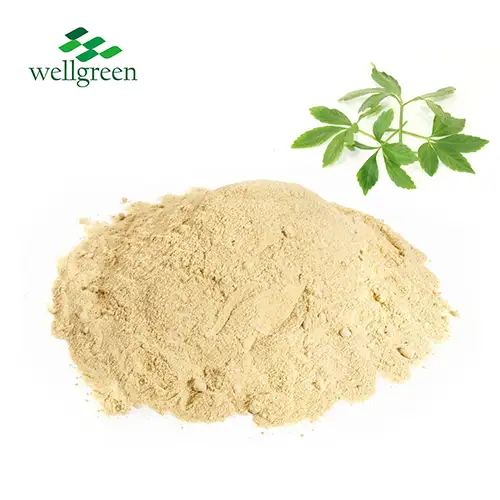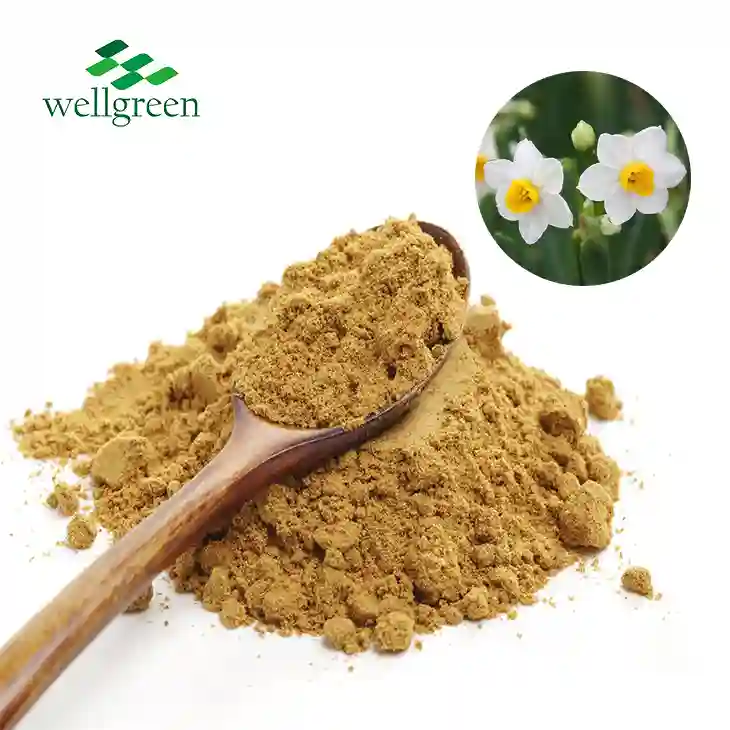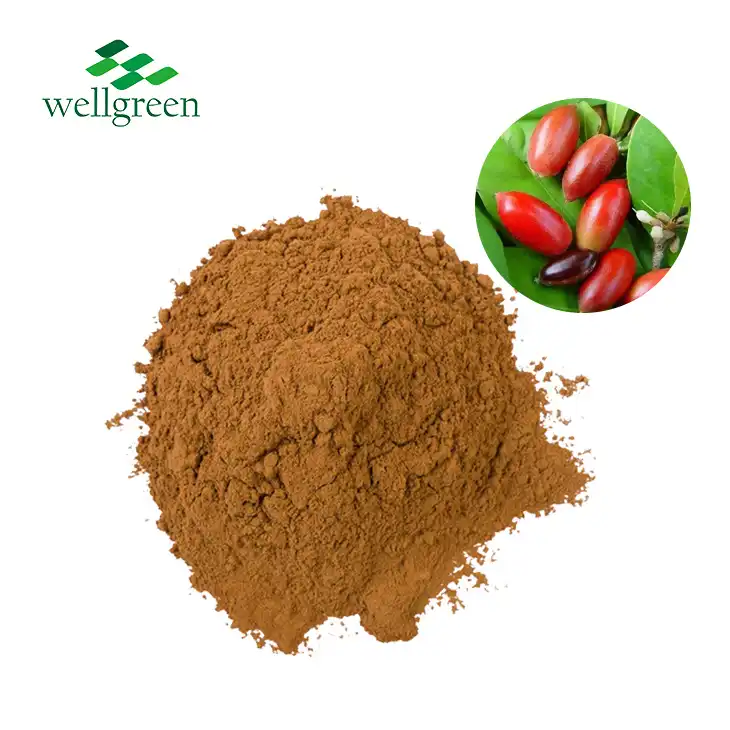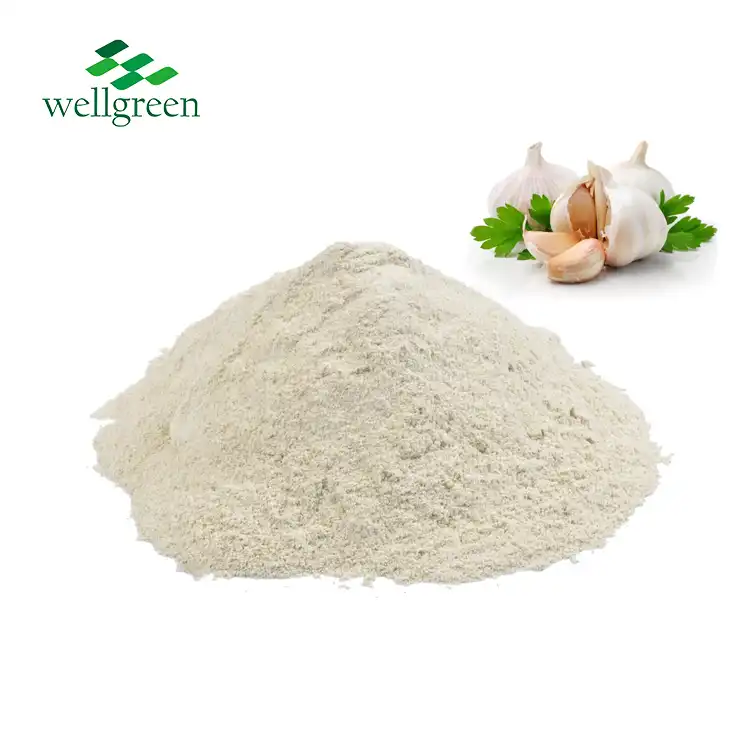Resveratrol Powder vs Vitamin C: Which Antioxidant Is Stronger?
2025-10-10 15:51:03
When it comes to antioxidant powerhouses, resveratrol powder and vitamin C often take center stage. Both offer impressive health benefits, but determining which is stronger depends on various factors. Resveratrol, found in red grape skins and available as resveratrol extract powder, excels in combating cellular aging and inflammation. Vitamin C, a well-known immune booster, shines in collagen production and free radical neutralization. While vitamin C may have more widespread recognition, resveratrol's unique properties, especially in cardiovascular health, make it a formidable contender. Ultimately, both antioxidants complement each other, working synergistically to promote overall well-being. The choice between resveratrol bulk powder and vitamin C often depends on individual health goals and needs.

How Do Their Antioxidant Mechanisms Differ?
Resveratrol's Unique Molecular Action
Resveratrol powder operates through a distinct molecular mechanism. This polyphenol activates sirtuins, particularly SIRT1, which are proteins involved in cellular regulation and longevity. By stimulating these "longevity genes," resveratrol enhances mitochondrial function and energy production. This action not only combats oxidative stress but also promotes cellular repair and resilience. Resveratrol's ability to mimic caloric restriction at a cellular level further contributes to its anti-aging properties, making resveratrol extract powder a popular choice for those seeking comprehensive cellular protection.
Vitamin C's Direct Scavenging Approach
In contrast, vitamin C employs a more direct approach in its antioxidant activity. As a water-soluble vitamin, it readily donates electrons to neutralize free radicals. This process effectively breaks the chain reaction of oxidative damage in cells. Vitamin C's rapid action makes it particularly effective in immediate protection against environmental stressors like UV radiation and pollution. Its role in recycling other antioxidants, such as vitamin E, further amplifies its protective capabilities, creating a robust defense system against oxidative stress.
Comparative Cellular Penetration
The cellular penetration of these antioxidants differs significantly. Resveratrol bulk powder, being lipophilic, easily crosses cell membranes and can accumulate within cells. This property allows resveratrol to exert its effects directly on intracellular processes and even interact with DNA. Vitamin C, while highly effective in extracellular spaces, requires specific transporters to enter cells. This difference in cellular accessibility influences their respective roles in cellular protection and signaling, with resveratrol potentially having a more profound impact on intracellular processes.
Comparative Benefits in Cellular Protection
Resveratrol's Anti-Inflammatory Edge
Resveratrol powder stands out for its potent anti-inflammatory properties. By modulating inflammatory pathways and inhibiting pro-inflammatory molecules, resveratrol offers comprehensive protection against chronic inflammation. This action is particularly beneficial in preventing age-related diseases and supporting cardiovascular health. Resveratrol's ability to activate AMPK, a key regulator of cellular energy, further enhances its protective effects. These properties make resveratrol extract powder an attractive option for those seeking long-term cellular health and disease prevention.
Vitamin C's Collagen Synthesis Superiority
Vitamin C excels in its role in collagen synthesis, a crucial aspect of cellular and tissue health. As a cofactor in collagen production, vitamin C is essential for maintaining skin elasticity, wound healing, and overall connective tissue integrity. Its ability to stimulate collagen synthesis surpasses that of resveratrol powder, making it indispensable for skin health and tissue repair. Additionally, vitamin C's role in iron absorption and immune function further contributes to its overall cellular protective effects, especially in acute situations requiring rapid immune response.
DNA Protection Capabilities
Both antioxidants offer significant DNA protection, but through different mechanisms. Resveratrol bulk powder interacts directly with DNA, potentially influencing gene expression and DNA repair mechanisms. Its ability to activate sirtuins also plays a role in maintaining genomic stability. Vitamin C, while not directly interacting with DNA, provides crucial protection by neutralizing free radicals that could otherwise damage genetic material. The combination of these complementary actions suggests that both antioxidants are valuable for comprehensive DNA protection, with resveratrol potentially offering more long-term genomic benefits.

Synergistic Effects on Overall Health
Cardiovascular Health Synergy
The combination of resveratrol powder and vitamin C creates a powerful duo for cardiovascular health. Resveratrol's ability to improve endothelial function and reduce inflammation in blood vessels complements vitamin C's role in maintaining arterial flexibility and reducing oxidative stress. Together, they may offer enhanced protection against atherosclerosis and hypertension. Resveratrol's potential to activate SIRT1, coupled with vitamin C's support in nitric oxide production, can lead to improved blood flow and vascular health, showcasing the synergistic benefits of these antioxidants in heart health maintenance.
Immune System Enhancement
While vitamin C is renowned for its immune-boosting properties, resveratrol extract powder also plays a significant role in immune modulation. Vitamin C supports the production and function of white blood cells, enhancing the body's first line of defense. Resveratrol, on the other hand, helps regulate the immune response, potentially reducing the risk of autoimmune reactions. The combination of these effects can lead to a more balanced and effective immune system. This synergy is particularly valuable in addressing both acute immune challenges and long-term immune health, offering a comprehensive approach to immunity.
Cognitive Function and Neuroprotection
In the realm of brain health, resveratrol bulk powder and vitamin C offer complementary benefits. Resveratrol's ability to cross the blood-brain barrier allows it to directly influence neuronal health, potentially slowing cognitive decline and offering neuroprotection. Its anti-inflammatory properties may also help in preventing neurodegenerative diseases. Vitamin C, essential for neurotransmitter synthesis and antioxidant protection in the brain, supports overall cognitive function. The combination of these antioxidants may provide a more comprehensive approach to maintaining brain health, potentially enhancing memory, learning, and overall cognitive resilience as we age.
Conclusion
In the debate of resveratrol powder vs vitamin C, it's clear that both antioxidants offer unique and powerful benefits. Resveratrol's strength lies in its cellular longevity effects and anti-inflammatory properties, while vitamin C excels in immediate antioxidant action and collagen synthesis. Rather than choosing one over the other, the most effective approach may be to incorporate both into a balanced health regimen. Their synergistic effects on cardiovascular health, immune function, and cognitive protection underscore the value of a diverse antioxidant strategy. By harnessing the strengths of both resveratrol and vitamin C, individuals can create a robust defense against oxidative stress and age-related decline.
Contact Us
For high-quality resveratrol powder, contact Wellgreen Biological Technology Co., Ltd. As a leading resveratrol powder manufacturer and supplier, we offer premium plant extracts and natural organic powders. Email us at wgt@allwellcn.com for inquiries about bulk resveratrol powder supply, custom formulations, or to discuss your specific antioxidant supplement needs.
References
1. Smoliga, J. M., Baur, J. A., & Hausenblas, H. A. (2011). Resveratrol and health – A comprehensive review of human clinical trials. Molecular Nutrition & Food Research, 55(8), 1129-1141.
2. Padayatty, S. J., Katz, A., Wang, Y., Eck, P., Kwon, O., Lee, J. H., ... & Levine, M. (2003). Vitamin C as an antioxidant: evaluation of its role in disease prevention. Journal of the American College of Nutrition, 22(1), 18-35.
3. Bonnefont-Rousselot, D. (2016). Resveratrol and cardiovascular diseases. Nutrients, 8(5), 250.
4. Carr, A. C., & Maggini, S. (2017). Vitamin C and immune function. Nutrients, 9(11), 1211.
5. Walle, T., Hsieh, F., DeLegge, M. H., Oatis, J. E., & Walle, U. K. (2004). High absorption but very low bioavailability of oral resveratrol in humans. Drug Metabolism and Disposition, 32(12), 1377-1382.
6. Patel, K. R., Scott, E., Brown, V. A., Gescher, A. J., Steward, W. P., & Brown, K. (2011). Clinical trials of resveratrol. Annals of the New York Academy of Sciences, 1215(1), 161-169.






